Retrieval
1/25
There's no tags or description
Looks like no tags are added yet.
Name | Mastery | Learn | Test | Matching | Spaced | Call with Kai |
|---|
No analytics yet
Send a link to your students to track their progress
26 Terms
retrieval
“The process of recovering a target memory based on one or more cues, subsequently bringing that target into awareness” (Baddeley et al., 2015)
How do cues lead to retrieval?
Retrieval as cue-feature matching Current context provides cues Cues match and activate certain features of the target Activation spreads, given that memory of features are connected Activation completed: target retrieved
Encoding specificity principle (ESP):Tulving
Retrieval success is determined by the amount of overlap (match) between the conditions present at retrieval and the conditions present at encoding Larger the overlap, more likely to retrieve successfully
Importance of cues
Tulving & Pearlstone (1966) Study phase (encoding). Participants studied 48 words with their category names (2 words per category), e.g., bird-parakeet, bird-sparrow fruit-melon, fruit-guava profession-engineer, profession-lawyer Test phase (retrieval). Later, they were tested on the words
Free recall group: asked to recall words, no cues given Cued recall group: asked to recall the words, with cues of 24 category names: bird? fruit? Which group recalled more words? Why?
Tulving & Pearlstone (1966)
Distinguished between availability and accessibility of memory traces: Availability – the memory is stored and could potentially be retrieved, given the right cues Accessibility – the memory can be retrieved in current conditions Inability to retrieve a memory does not mean the memory is not stored
Tulving & Osler (1968)
Can a weak cue lead to successful recall, as long as it was present at encoding? Study phase (encoding). Participants studied targets (single words) with weakly associated cues (emblem – EAGLE) Test phase (retrieval). Later, recalled targets (e.g., EAGLE) Free recall group: no cue Cued recall group, same (encoded) weak cue: emblem? Cued recall group, different (not encoded) weak cue: soar? Results? Same weak cue > no cue > different weak cue Why?
Thomson & Tulving (1970) pt1 results
Will strong cues (i.e., highly associated ones) lead to successful recall if they were not present at encoding?
Input condition (W). Participants studied target words (BLACK), with weak cues (train – BLACK). Strong cues (white) were not presented Output Condition (W). Recall test with weak cues (train?) This repeated using list 1 and 2 List 3, study with weak cues (W), recall with: No cue (0): drop, compared to list 2 Weak cues (W): same Strong cues (S): drop List 4, study with weak cues (W), recall with: Strong cues (S): drop Strong cues do not lead to retrieval success, if they are not present at encoding. Support the encoding specificity principle
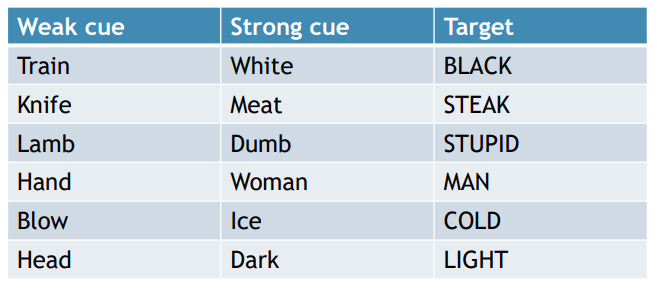
Thomson & Tulving (1970) results pt2
Input condition (0). Participants studied target words (BLACK), without cues Output Condition (0). Recalled without cues This repeated using list 1 and 2 List 3, study with no cues (0), recall with: No cues (0): same Weak cue (S): same Strong cues (S): improve List 4, study with no cues (0), recall with: Strong cues (S): improve Participants might have generated strong cues themselves at encoding.
Factors affecting retrieval success: Attention at encoding
Fernandes & Moscovitch (2000)
Divided attention (DA) at encoding Study phase. Memorise auditorily presented words, either in Full attention condition; or Divided attention (DA) condition. Monitor materials at the same time: Man-made object: press key when seeing 3 consecutive man-made object words Odd-digit: press key when seeing 3 consecutive odd numbers Test phase. Recall the auditorily presented words DA at encoding impaired recall regardless of distracting tasks
Factors affecting retrieval success: Attention at retrieval
Divided attention (DA) at retrieval Study phase. Memorise auditorily presented words Test phase. Recall the auditorily presented words in 60s Full attention condition; or Divided attention (DA) condition. Monitor materials at the same time: Man-made object: press key when seeing 3 consecutive man-made object words Odd-digit: press key when seeing 3 consecutive odd numbers DA at retrieval impaired recall. More when the distracting task is word-based (man-made object) than digit-based
Factors affecting retrieval success: Number of cues
Superadditive effect of extra cues: Rubin & Wallace (1989) Participants heard cues and came up with words (target: ghost) Semantic cue only. “mythical being?” 14% generated “ghost” Rhyme cue only. “rhymes with post?” 19% Semantic and rhyme cues. “mythical being, rhymes with post?” 97%
Elaborative encoding – generate mediator cues to help retrieval Pyc & Rawson (2010) Study Swahili-English translation pairs, e.g., wingu-cloud Participants were asked to generate mediators for the pairs: keywords that… look/sound similar to Swahili (wingu), and semantically related to English (cloud) E.g., Wingu → wing → cloud Repeated testing allowed strengthening of the mediation/elaboration, and generation of more mediator cues, e.g., Wingu → wind → cloud This leads to better cued recall (Wingu?)
Factors affecting retrieval success: Context-dependent memory
If retrieval occurs in same context as encoding (cues overlap), recall will be enhanced Context: A collection of cues External: environment Internal: mood, state, internal thoughts
Environment as context (water)
Godden & Baddeley (1975): Studied words, on land or underwater Recall later, on land or underwater 4 groups:
No main effect of dry vs. wet Interaction between encoding and retrieval contexts: • items encoded in a dry context were better retrieved in a dry context • items encoded in a wet context were better retrieved in a wet context
enviroment as context (air)
Thompson, Williams, L’Esperance, and Cornelius (2001): Experiment 1: Studied words, in the air or on land Recalled later, in the air or on land Main effect of learning environment. Why? Context-dependent: on land, in the air? Why (not)?
Thompson, Williams, L’Esperance, and Cornelius (2001): Experiment 2: Air: watch a skydiving video Context-dependent effects
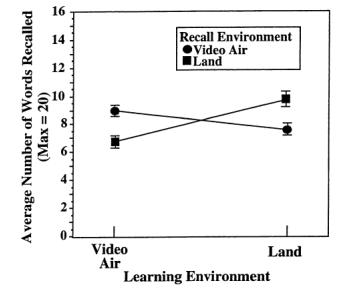
Enviroment as context (study)
Smith (1979): Experiment 1: Studied lists of words, in room A Recalled later, in room A, B, or C Results. Context-dependent: recall in room A > B = C
Smith (1979): Experiment 2: Studied lists of words, in room A Recalled later In room A (same context; SC) In room B (different context; DC) In room B, instructed to reinstate room A (DC-R) Results? SC = DC-R > DC What does it suggest?
Experiment 3: what if we study in too many different rooms to reinstate the target room?
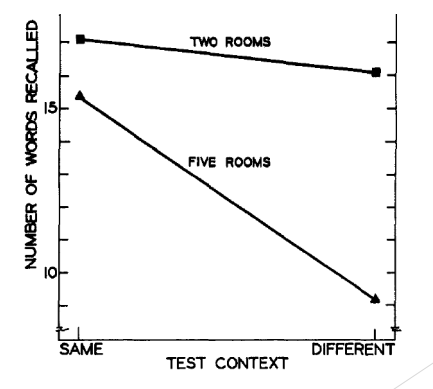
Environment as context: boundary conditions
Context reinstatement benefits recall but not always recognition – why? Context reinstatement provide cues which may be in short supply during recall. Recognition tasks provide strong cues already.
Environmental features as context
Noisy vs silent conditions: Grant et al. (1998): Read article, in noisy (university cafeteria) or silent conditions Cued recall, in noisy or silent conditions Results. Same > different conditions Male and female voices: Geiselman and Glenny (1977): Studied stimuli in male and female voices Items better recognised when test voice was same as at study
Internal context: physiological state (caffeine)
Keleman and Creeley (2003): caffeine Studied 40 pairs of words, with a beverage containing caffeine (C) or placebo (P) Cued recall test, with a beverage containing C or P State dependency effect found
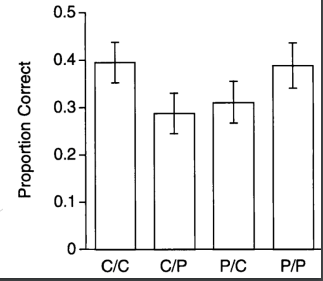
Internal context: physiological state (marijuana)
Eich (1975): marijuana Studied words, smoking marijuana or placebo Recalled later, smoking marijuana or placebo Free recall. State dependency effect? Cued recall. State dependency effect? Main effect of recall type?
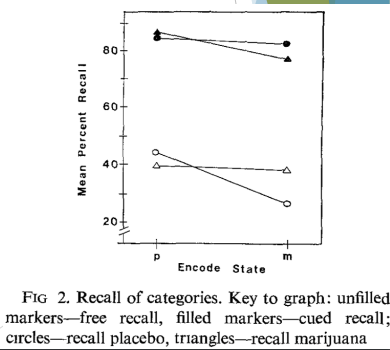
Internal context: physiological state (alcohol)
Eich (1980): review of 57 drug studies Type of retrieval test: best predictor of statedependency effect Peterson (1977): Alcohol State dependency effect for free recall, but not cued recall
Internal context: physiological state (exercise)
Aerobic exercise Miles & Hardman (1998): Words learned during exercise better recalled (free recall) during exercise, those learned at rest better recalled at rest Schramke & Bauer (1997): Older and younger adults Walking vs resting before learning words State dependency effect found for free recall, but not cued recall or recognition
Internal context: mood
Mood Mood dependent memory: recall enhanced when same mood at encoding and at retrieval Mood congruent memory: tendency to produce memories with the same emotional tone as current state (e.g., more happy memories when you are happy, and sad memories when you are sad)
Internal context: cognitive state
Cognitive state: ideas, thoughts, concepts, languages Marian & Neisser (2000): Experimenter interviewed Russian-English bilingual participants on topics such as friends, holiday, birthday, In Russian In English Participants shared life stories Talking in one language “mode” (e.g., Russian) => retrieve memories acquired in that mode
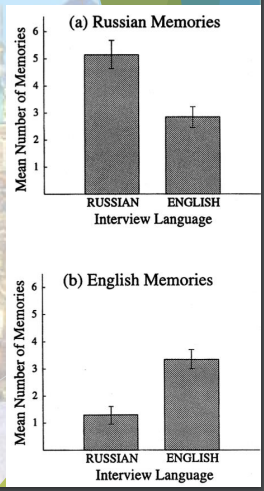
Boundary conditions: What factors affect the effectiveness of context as a cue?
Extent to which context is needed for successful retrieval (“outshining” hypothesis, Smith, 1988) If other cues are powerful enough to elicit retrieval, no need to draw on context, e.g., recognition tests – provide strong cue.
Extent to which context is or is not encoded with the target memory Stress at encoding => lack of attention to study material Paired associate learning => attention directed to cuetarget association rather than to background context Lack of distinctiveness or prominence of context Long retention interval => Weak connection between context and target
Extent to which encoding context is/can be reinstated at retrieval (mental reinstatement hypothesis): Use of appropriate strategy – imagine original context if physically unavailable Many similar contexts => more difficulty mentally reinstating context Many items associated with same context => cue overload (Tulving & Pearlstone, 1966)
Environment as context – practical application
The police help witnesses to recall details in crime scenes Crime reconstructions: recreating cues present at time Context reinstatement in “cognitive interview”
Cognitive interview (Geiselman, Fisher, MacKinnon, & Holland, 1985)
Elements of cognitive interviews: Reinstate context of event Encourage reporting of every detail, no matter how insignificant it appears Describe incident in different order Describe incident from different viewpoints Encourages generation of many potential retrieval cues, and maximises overlap of retrieval and encoding cues.